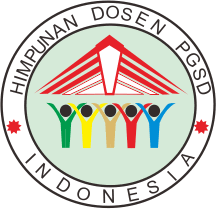Analisis self-regulated learning (srl) berdasarkan perspektif filsafat stoikisme pada mahasiswa PGSD surakarta tahun pertama yang aktif berorganisasi
Abstract
Keywords
Full Text:
PDFReferences
R. Festiawan, “Belajar dan Pendekatan Pembelajaran,” 2020. [2] R. Yanuarsari and H. Suhendraya Muchtar, “FILSAFAT DINTERAKSI BERBASIS ANDRAGOGI DALAM PROSES PEMBELAJARAN MAHASISWA,” 2019. [3] M. S. Knowles, “Andragogy: Adult Learning Theory in Perspective,” 1978. [4] W. Rai, “GAGASAN ANDRAGOGI DAN BELAJAR MANDIRI DALAM PEMBERDAYAAN MASYARAKAT,” 2013. [5] W. Lestari, “Pengembangan Modul Pembelajaran Bahasa Inggris Berbasis Andragogi Pada Program Studi Pendidikan Biologi di Universitas Muhammadiyah Palembang,” Edunesia : Jurnal Ilmiah Pendidikan, vol. 2, no. 1, pp. 171–177, Jan. 2021, doi: 10.51276/edu.v2i1.114. [6] G. Light, S. Calkins, and R. Cox, Learning and teaching in higher education: The reflective professional. Sage, 2009. [7] Arifin Maksum and Ika Lestari, “ANALISIS PROFIL KEMANDIRIAN BELAJAR MAHASISWA DI PERGURUAN TINGGI,” PARAMETER: Jurnal Pendidikan Universitas Negeri Jakarta, vol. 32, no. 1, pp. 75–86, Aug. 2020, doi: 10.21009/parameter.321.05. [8] A. Chita, P. Harahap, and S. R. Harahap, “Covid 19: Self Regulated Learning Mahasiswa,” vol. 10, no. 1, p. 2020, [Online]. Available: http://jurnal.uinsu.ac.id/index.php/al-irsyad [9] B. J. Zimmerman, “Becoming a Self-Regulated Learner: Which Are the Key Su bprocesses?,” 1986. [10] J. W. Santrock, Educational psychology. McGraw-Hill Education, 2017. [11] F. O. Grahani, “Self regulated learning (SRL) pada mahasiswa ditinjau dari keikutsertaan dalam organisasi,” Jurnal Psikologi: Media Ilmiah Psikologi, vol. 17, no. 2, 2019. [12] W. B. Irvine, A guide to the good life: The ancient art of Stoic joy. Oxford University Press, 2008. [13] H. Manampiring, Filosofi Teras. 2019. [14] M. Pigliucci, How to be a stoic: Ancient wisdom for modern living. Random House, 2017. [15] M. S. Kn
Refbacks
- There are currently no refbacks.



